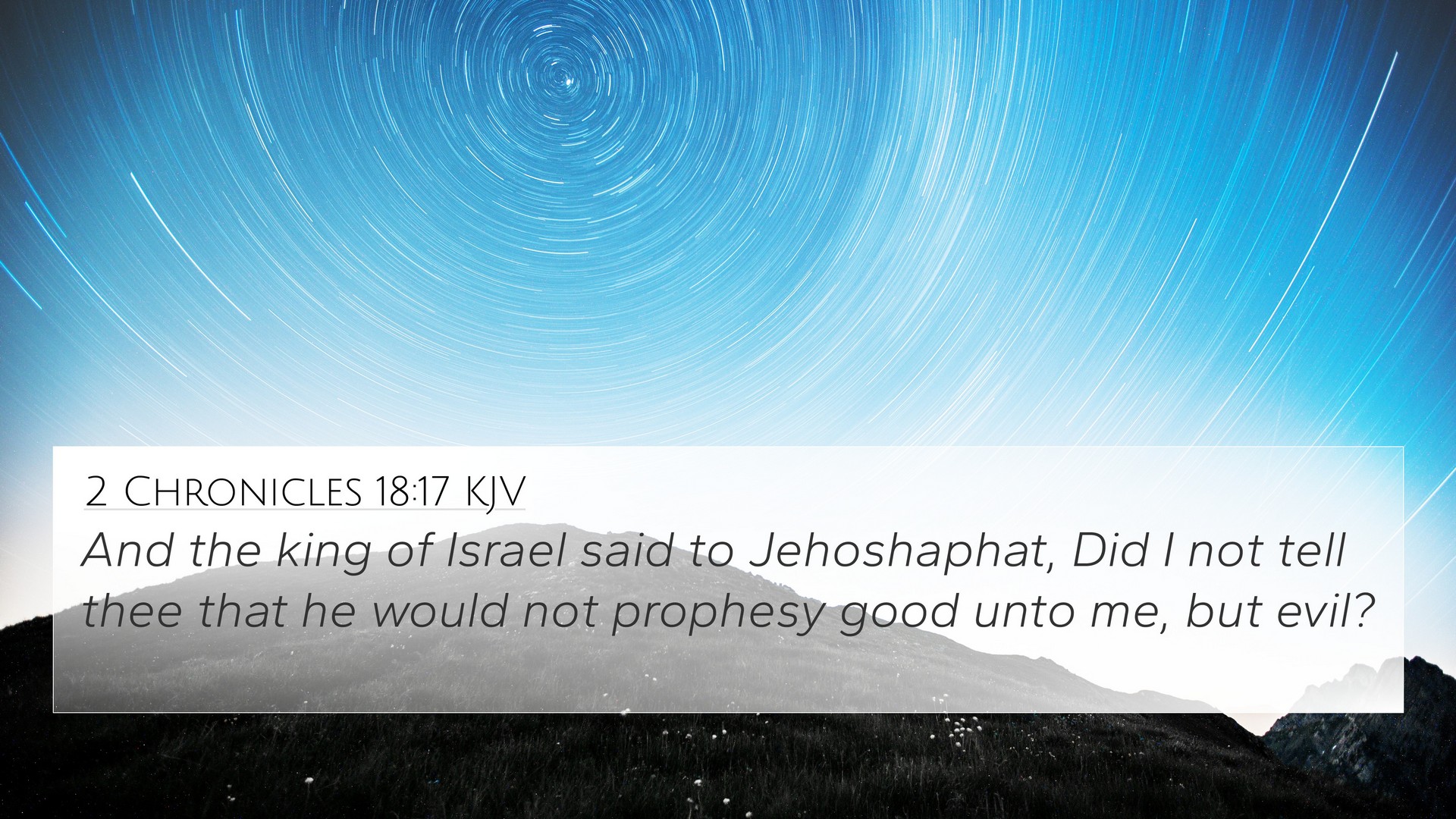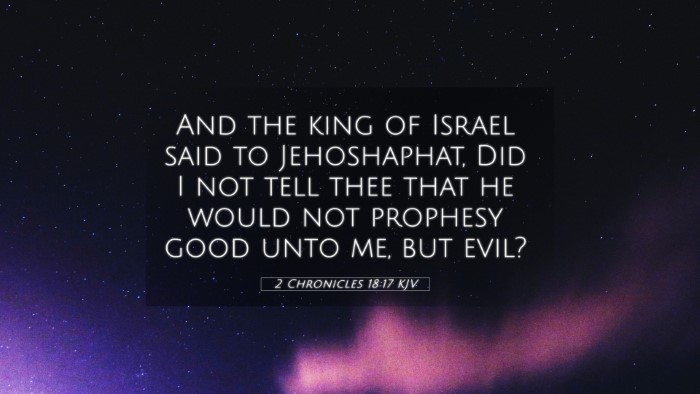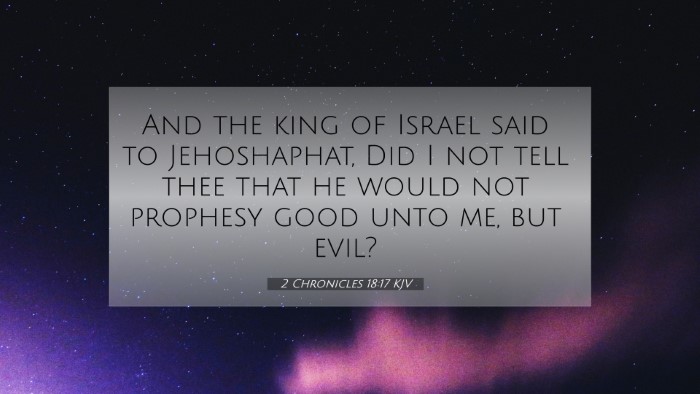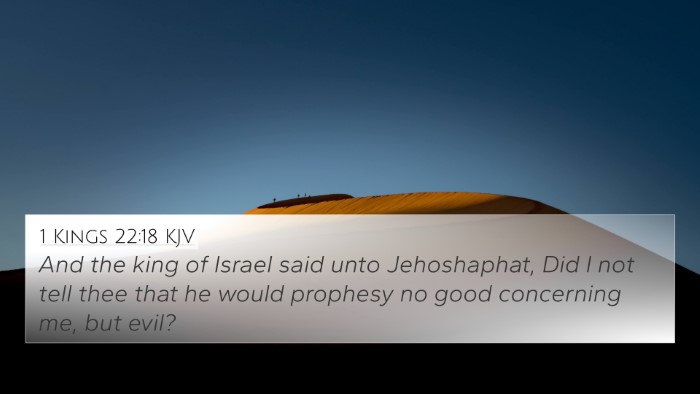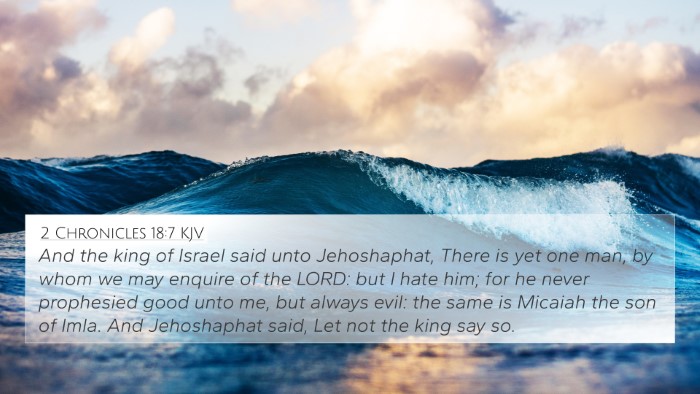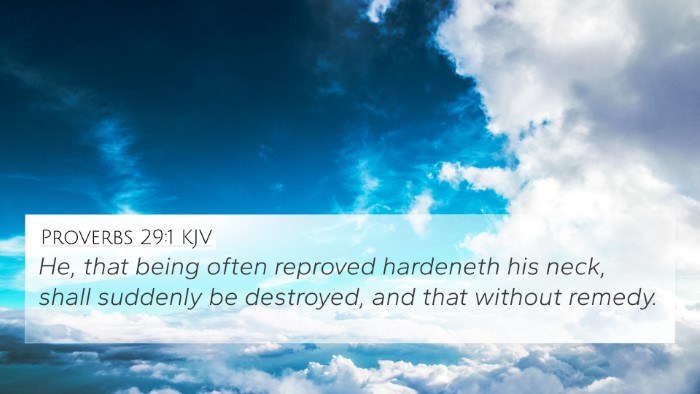Understanding 2 Chronicles 18:17
Bible Verse: 2 Chronicles 18:17 - "And the king of Israel said to Jehoshaphat, 'There is still one man by whom we may inquire of the LORD, but I hate him, for he never prophesies good concerning me, but always evil. He is Micaiah the son of Imla.' And Jehoshaphat said, 'Let not the king say so.'
Contextual Analysis
This verse is set against the backdrop of an alliance between the Northern Kingdom of Israel led by King Ahab and the Southern Kingdom of Judah led by King Jehoshaphat. The narrative centers on the inquiry of a prophet to seek God's counsel before going to battle against Ramoth-gilead. Ahab expresses disdain towards Micaiah, the prophet, for his consistently negative prophecies, demonstrating the complex relationship between divine truth and human desire.
Commentary Insights
- Matthew Henry: Henry emphasizes Ahab's unwillingness to hear the truth that Micaiah spoke, noting that kings often surround themselves with flattering advisors instead of those who give honest counsel. This highlights a frequent biblical theme: the rejection of divine truth for personal comfort.
- Albert Barnes: Barnes notes that this passage illustrates the moral conflict of Ahab and serves as a cautionary reminder; true prophets often speak prophecies that are contrary to what rulers wish to hear. Barnes further elaborates that Jehoshaphat’s intervention reflects a noble desire for divine clarity rather than personal bias.
- Adam Clarke: Clarke points out the significance of Micaiah’s integrity as a prophet. He believes the verse showcases the tension between divine judgment and human authority, revealing how leaders may resist the truth to pursue their personal agendas.
Thematic Connections
This verse underscores several important themes in Scripture:
- The struggle between divine truth and human pride
- The role of prophets in biblical narratives
- The moral responsibility of leaders to seek and heed God's counsel
Cross-References
To fully understand 2 Chronicles 18:17, we can look at several other passages that enrich our comprehension:
- 1 Kings 22:8 - Ahab’s attitude toward Micaiah is reiterated, emphasizing his hatred for unfavorable prophecy.
- 2 Chronicles 19:2 - Jehu reprimands Jehoshaphat for his alliances, highlighting the necessity of discretion in seeking counsel.
- Jeremiah 23:16 - A prophet is warned against prophesying peace when there is no peace; reflecting Micaiah's situation.
- Proverbs 12:15 - The way of a fool is right in his own eyes, but a wise man listens to counsel, resonating with Ahab’s dismissal of Micaiah.
- Matthew 5:10 - Blessed are those who are persecuted for righteousness' sake, paralleling Micaiah’s experience.
- Micah 3:5 - This verse highlights how prophets who speak peace will be paid, connecting to Ahab's preference for flattering prophecies.
- John 15:18-19 - Jesus warns His disciples of persecution for embracing the truth, relating to Micaiah's treatment by Ahab.
Tools for Further Study
For individuals seeking to deepen their understanding of 2 Chronicles 18:17 and similar verses, consider the following:
- Bible Concordance: Look up terms like "prophet" and "counsel" to find interconnected verses.
- Bible Cross-Reference Guide: Use this tool to explore thematic connections between verses.
- Cross-Reference Bible Study: Develop a structured method to analyze verses in context.
- Inter-Biblical Dialogue: Engage with both Old and New Testament teachings to uncover deeper meanings.
Conclusion
2 Chronicles 18:17 serves as a profound reminder of the conflict between the truth of God's message and the desires of the human heart. Through the insights of various commentators and the links with other Scriptures, we see the importance of seeking truth and integrity in our spiritual journeys.
